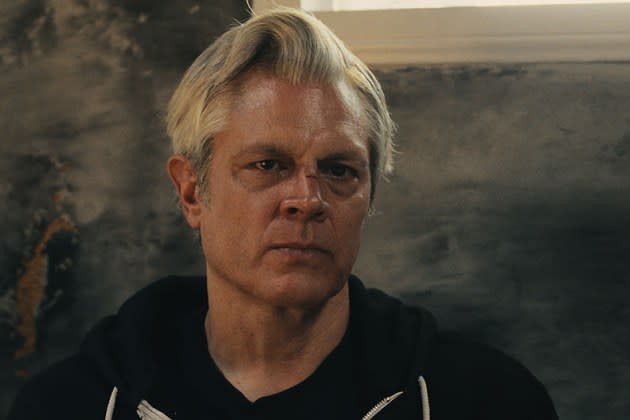‘Sweet Dreams’ Review: Johnny Knoxville Gives Familiar Addiction Dramedy Some Soul
- Oops!Something went wrong.Please try again later.
- Oops!Something went wrong.Please try again later.
- Oops!Something went wrong.Please try again later.

Johnny Knoxville always seems to display an aching vulnerability, and it’s not just because he’s voluntarily endured years of intense bodily suffering as a result of his Jackass movies. So he seems the perfect choice to play the central character in Lije Sarki’s raucous black comedy that plays like a Bad News Bears featuring recovering addicts rather than precocious children.
Knoxville plays Morris, whose sad state of affairs is made immediately apparent in the opening scene: He’s shown waking up nearly naked and bloody on a park bench, having clearly been on one hell of a bender the night before. Even worse, he had apparently left his eight-year-old daughter home alone, making him realize he’s a danger to others as well as himself.
More from The Hollywood Reporter
To try to get his life back on track, Morris signs up for a 90-day stint at Sweet Dreams, a rehab center in a run-down suburban house owned and operated by the friendly but no-nonsense Pete (comedian Mo Amer, Netflix’s Mo). Morris has some difficulty adjusting to his new environment, which requires him to temporarily surrender his cell phone and deal with a hygienically-challenged roommate. But he does meet some colorful characters, including Frank (Jay Mohr), a former big-shot Hollywood mogul whose career hit the skids due to his addictions.
The only time Morris seems relatively happy in his new surroundings is when he joins a softball game with his fellow patients — a colorfully boisterous lot that includes Jake (rapper/actor Gata), Cruise (Bobby Lee, Mad TV), Mike D (Brian Van Holt), Dip (Jonnie Park), Cedric (hardcore rocker/rapper Shakewell), Stew (Adam Faison) and Diego (Erik Anthony Gonzalez) — and reveals himself to have solid playing skills.
When the financially struggling Pete finds himself in danger of losing the house, the patients rally to help him out by forming a softball team with Morris as their coach and competing in a local tournament featuring an $80,000 prize (this isn’t the sort of thing that happened when I was growing up, but artistic license, I guess). Cue the ensuing mild wackiness, as the less than talented players find themselves losing one game before it’s even over because the lopsided 11-1 score triggers a “mercy rule.” To improve their fortunes, the team recruits several talented female ringers, including Kate (model/actress Kate Upton), who wields a mean bat.
The baseball hijinks, which don’t actually prove very entertaining, thankfully take a back seat to Morris’ story, with Knoxville displaying surprising depths of emotion as the alcoholic desperately trying to regain access to the daughter his ex-wife refuses to let him contact. When a now-released Frank takes him to eat at a favorite restaurant only to discover that it’s suffered terrible damage as a result of being hit by a truck, Morris realizes to his horror that he was the driver during one of his many blackout episodes. He later returns to confess to the restaurant owner and make amends, and receives a surprising and touching response.
Director Sarki (producer of The Peanut Butter Falcon) takes a decidedly casual approach to the storytelling, seemingly less interested in narrative dynamics, whether comedic or dramatic, than establishing a loose, convivial vibe. That the film proves as affecting as it does is largely due to Knoxville’s understated, terrific performance that makes his character fully sympathetic despite his many flaws. The scene in which Morris is tearfully reunited with his daughter at the climactic game, gently asking her for permission to bring Pete when they go for ice cream because he’s not yet allowed to be out on his own, proves that he’s an actor as capable of emotional pathos as getting gored by bulls.
Best of The Hollywood Reporter

